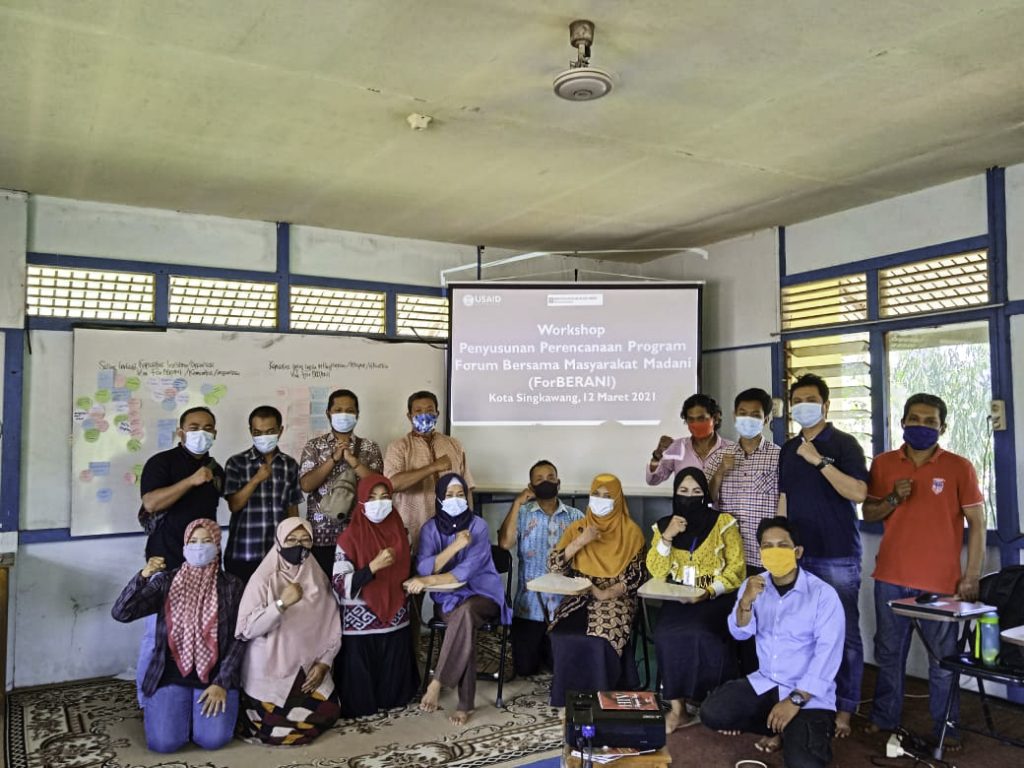
Participants at a Forum
Performance Index (FPI)
workshop, organized by PKBI during the establishment of the ForBERANI Learning
Forum.
Over more than three decades, PKBI in Singkawang has demonstrated its ability to work effectively on matters pertaining to reproductive health. However, through their work with MADANI in recent years, they have also built new trust with the district government on issues related to inclusive education.
Human capital development is a central part of Singkawang’s overall development strategy. However, local civil society organizations (CSOs) have not always been a part of that strategy. For example, although there were 119 registered CSOs in the city, their generally negative reputation among front line agencies made it difficult for them to gain the trust of the government. In addition, CSOs mostly worked in silos, were unorganized, and had poor internal governance. However, as they have strengthened their engagement with youth and vulnerable groups at the grassroots level in recent years, the local government has increasingly acknowledged that civil society actors are an integral part of local development.
As MADANI’s CSO partner since 2021, PKBI understood clearly that the only way to participate more effectively in addressing local development challenges was to increase their organizational capacity, accountability, and legitimacy. With MADANI’s assistance, PKBI established the multi-stakeholder Learning Forum, Forum Bersama Rakyat Harmoni (ForBERANI). ForBERANI brings together the media, academia, other CSOs, corporations, and the government to collaborate on key local development challenges. They selected inclusive education as their initial thematic focus.
Among all 15 districts in West Kalimantan, Singkawang scores second highest on the Human Development Index after the provincial capital of Pontianak (72.89 out of a maximum score of 100). However, education remains inaccessible for many children in the district. The district’s communities face a variety of challenges to implementing Indonesia’s policy on inclusive education, such as a lack of local regulations and funding for the necessary human resources and infrastructure. In 2021, as many as 11,845 children aged seven to 15 years old were not on track to complete elementary or junior high school.
Together with PKBI, ForBERANI has advocated for a more inclusive education system, particularly equal access to education for all children, including those with disabilities and from indigenous communities. At the end of 2021, ForBERANI issued a policy paper that recommended the provision of new teaching assistants and special study rooms, improved training for teachers,and the development of standard operating procedures and road map for more inclusive schools. They also worked on a local solution to make schools more inclusive by involving the community in guiding schools towards more inclusive practices.
Dr. H. Bujang Sukri, Acting Head of the Regional Agency for National Unity and Politics (Kesbangpol) in Singkawang City, stated: “We believe education is for all children, and no one should be left behind.” Dr. Sukri continued: “[Children] all have the rights to an education regardless of their background factors.”
In January 2022, the District Education and Culture Agency worked with PKBI and ForBERANI to apply the local solution to collaboratively address student accessibility issues at two public elementary schools and two public junior high schools. First, they formed working groups within the schools, involving CSOs, academics, teachers, and relevant district agencies. The working groups then oversaw the implementation of the program and conducted regular evaluations to measure progress and to ensure that the approaches achieved their desired outcomes.

Staff from various district agencies, Kesbangpol, ForBERANI, teachers, and students from local schools participate in a MADANI-organized workshop on complaint handling and questionnaire development.
Asmadi, Head of the Singkawang Education and Culture Agency, stated: “We hope the working group can develop a workplan that supports our inclusive education initiative.” Asmadi continued: “This is an inter-agency effort, and it will go beyond providing access to children with disabilities but also those from Participants at a Forum Performance Index (FPI) workshop, organized by PKBI during the establishment of the ForBERANI Learning Forum. disadvantaged families.”
In April 2022, PKBI Singkawang continued their inclusivity initiative by creating a citizen complaintshandling survey to hold the city administration accountable on problems related to inclusive education and services that still need improvement or that have not yet been extended to children with disabilities. Armed with the survey results and feedback from the school working groups, PKBI and the Singkawang Government launched a Service Improvement Charter in June 2022 to enhance inclusive education at four selected public schools.
Peer to peer learning among MADANI’s partner CSOs has played a critical part in this landmark achievement. The Charter was a direct result of many interactions and much knowledge sharing between PKBI in Singkawang and MADANI’s partner CSO in Tasikmalaya, West Java, which had launched a service improvement charter to improve primary health care services there earlier in the year.
Roby Sanjaya, PKBI Program Manager, commended the process: “We have received so many positive responses and support from all our stakeholders who have been involved since the beginning of the initiative.”
PKBI and ForBERANI’s ongoing participation and active engagement with multiple stakeholders in their district illustrates how civil society can improve its knowledge and technical capacities to improve its relevance and address local accessibility issues. In addition, the CSOs’ increased professionalism has resulted in the local government having a more positive perception of local CSOs in general, and has gained them trust among government agencies that they reliable development partners.


